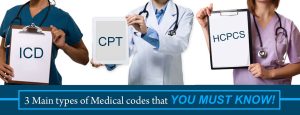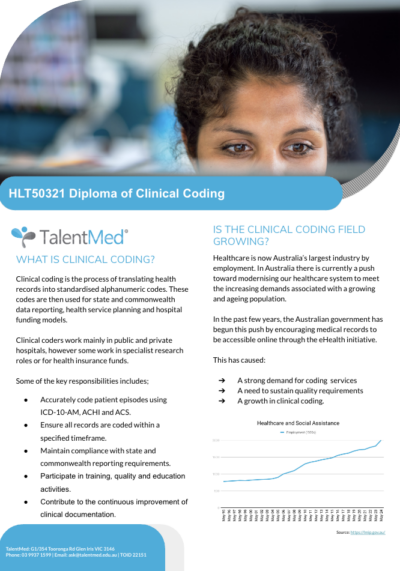To embark on a career as a clinical coder, there are various steps that you can undertake to ensure both a successful transition and long-term growth in this field. This article will provide a comprehensive overview of the necessary qualifications, skills, and experience required to become a clinical coder. By understanding the path that lies ahead, you will be equipped with the knowledge needed to navigate the intricate world of healthcare coding and contribute to the accuracy and efficiency of medical records.
Education and Training

Obtain a High School Diploma
To become a clinical coder, it is essential to start with a solid educational foundation. The first step is to obtain a high school diploma or its equivalent. A high school education provides the necessary basic knowledge and skills required for further education and training in the field of clinical coding.
Pursue a Bachelor’s Degree
While a high school diploma is the minimum requirement, many employers prefer candidates who have pursued higher education. Pursuing a bachelor’s degree in health information management or a related field can provide a more comprehensive understanding of healthcare practices and coding systems. A bachelor’s degree program typically covers topics such as medical coding, health information management, healthcare ethics, and data analysis.
Consider a Certification Program
In addition to a bachelor’s degree, completing a certification program in clinical coding is highly recommended. Certificate programs in clinical coding provide specialized training and focus on the specific coding systems and practices used in the field. These programs can be completed in a shorter timeframe compared to a bachelor’s degree and can enhance your job prospects and demonstrate your commitment to the field.
Develop Essential Skills

Attention to Detail
As a clinical coder, attention to detail is paramount. You will be responsible for accurately assigning codes to medical procedures, diagnoses, and other healthcare services. One small error in coding can have significant consequences for healthcare providers, insurance companies, and patients. Developing keen attention to detail will ensure that you accurately translate medical information into codes.
Analytical Skills
Analytical skills are crucial in clinical coding as you will need to analyze medical records, identify relevant information, and assign the appropriate codes. Being able to navigate complex medical documentation and identify the key pieces of information requires strong analytical thinking. Additionally, the ability to identify coding patterns and trends can help you become more efficient and accurate in your coding processes.
Medical Terminology
A solid understanding of medical terminology is essential for clinical coders. Knowledge of medical terms, anatomy, and physiology helps in accurately interpreting and translating medical documentation into codes. Familiarizing yourself with common medical terms, their abbreviations, and their context within medical records will significantly enhance your coding abilities.
Gain Clinical Experience

This image is property of d3njjcbhbojbot.cloudfront.net.
Internships
Internships provide valuable practical experience in a healthcare setting and can be a stepping stone towards a career in clinical coding. Seek out opportunities to intern at hospitals, medical clinics, or other healthcare facilities where you can observe and learn from experienced clinical coders. Internships allow you to apply your knowledge in a real-world setting and gain insight into the day-to-day responsibilities of a clinical coder.
Volunteer Work
Volunteering in healthcare-related organizations or clinics can also help you gain valuable exposure to the medical field. While you may not have direct coding responsibilities as a volunteer, being part of a healthcare team allows you to observe the coding process and understand the larger healthcare system. This hands-on experience will help you better understand the intricacies of clinical coding and its importance in healthcare delivery.
Shadowing
Shadowing experienced clinical coders is another excellent way to gain insight into the profession. By observing and learning from professionals already working in the field, you can gain practical knowledge on coding techniques, software usage, and documentation review. Shadowing experiences can be arranged through networking or by reaching out to professionals in the field or your local medical coding association.
Become Familiar with Medical Coding Systems

ICD-10
ICD-10 (International Classification of Diseases, Tenth Revision) is the primary coding system used by clinical coders worldwide. It provides a standardized set of codes for diseases, conditions, injuries, and procedures. Developing familiarity with ICD-10 coding guidelines, conventions, and structure is essential to accurately assign codes.
CPT
CPT (Current Procedural Terminology) codes are used to classify medical, surgical, and diagnostic procedures and services provided by healthcare professionals. Clinical coders must be familiar with the CPT coding system to accurately assign codes to procedures and services performed in medical settings. Understanding CPT coding rules and guidelines will ensure accurate and consistent coding practices.
HCPCS
HCPCS (Healthcare Common Procedure Coding System) is a coding system used primarily for Medicare and Medicaid claims. It includes codes for medical supplies, equipment, and services not covered by CPT codes. Familiarizing yourself with HCPCS codes will expand your coding knowledge and enable you to code a broader range of services.
Understand Health Insurance and Billing Practices

This image is property of www.stepintothenhs.nhs.uk.
Knowledge of Insurance Policies
To be an effective clinical coder, you need to have a solid understanding of health insurance policies and coverage. Familiarize yourself with the different types of insurance plans, coverage limitations, and reimbursement processes. This knowledge will enable you to navigate insurance requirements and accurately code procedures and services for appropriate reimbursement.
Understanding of Reimbursement Systems
Clinical coders play an essential role in ensuring accurate reimbursement for healthcare services. Understanding different reimbursement systems, such as fee-for-service, prospective payment systems, and diagnosis-related groups, is crucial. This knowledge will allow you to assign the appropriate codes that align with the specific reimbursement systems and guidelines.
Stay Updated with Industry Changes

Continuing Education
The field of clinical coding is constantly evolving, with regular updates to coding guidelines, regulations, and systems. It is crucial to stay updated with the latest changes and advancements in the industry. Participating in continuing education programs, workshops, and seminars will help you stay informed and maintain your proficiency in clinical coding.
Professional Development
Engaging in professional development activities is essential for career growth and staying updated with industry trends. Joining webinars, attending conferences, and reading industry publications will expose you to new coding techniques, emerging technologies, and best practices. Actively seeking out opportunities to enhance your professional skills will make you a more competent and competitive clinical coder.
Join Professional Organizations

This image is property of www.northwestcareercollege.edu.
AAPC
Consider joining professional organizations such as the AAPC (American Academy of Professional Coders). Membership in organizations like AAPC offers access to valuable resources, networking opportunities, and specialized training programs. These organizations provide a platform for interaction with other professionals, allowing you to exchange knowledge, stay updated, and foster professional relationships.
AHIMA
Another reputable professional organization in the field of clinical coding is AHIMA (American Health Information Management Association). AHIMA offers numerous resources, educational programs, and certifications that can support your professional growth. Becoming a member of AHIMA can provide access to industry-leading publications, networking events, and opportunities to contribute to the advancement of the field.
Prepare for Certification Exams

Review Study Materials
Certification exams are typically required to become a clinical coder. To prepare for these exams, it is crucial to review relevant study materials. Look for study guides, textbooks, and online resources that cover the exam topics comprehensively. Ensure that you allocate sufficient time for studying and create a study plan to cover all the necessary content.
Take Practice Tests
Taking practice tests is an effective way to assess your knowledge and build confidence before the actual certification exam. Practice tests help you become familiar with the format of the exam, identify areas where you may need additional study, and simulate the exam environment. Utilize available practice test resources to gauge your readiness and make any necessary adjustments to your study approach.
Obtain Certification

Pass the Certification Exam
Obtaining certification is a significant milestone in becoming a clinical coder. Certification exams are typically administered by professional coding organizations such as AAPC and AHIMA. These exams assess your knowledge and competence in clinical coding. By passing the exam, you demonstrate your proficiency and dedication to maintaining high coding standards.
Maintain Certification
Certification in clinical coding typically requires ongoing education to maintain its validity. Stay informed about continuing education requirements and complete the necessary courses or workshops to ensure your certification remains active. Additionally, participating in professional development activities and staying updated with industry changes will enhance your skills and maintain your professional standing.
Seek Employment Opportunities

Apply for Clinical Coding Positions
Once you have gained the necessary education, training, and certification, it’s time to apply for clinical coding positions. Look for job openings in hospitals, physician offices, insurance companies, and other healthcare organizations. Tailor your resume to highlight your relevant education, clinical experience, and certifications. Emphasize your attention to detail, analytical skills, and knowledge of coding systems to stand out to potential employers.
Utilize Networking
Networking can be a powerful tool in securing employment opportunities. Attend industry conferences, join online forums and communities, and actively seek connections with other clinical coders or healthcare professionals. Networking can provide valuable insights, job leads, and recommendations that can help you advance your career in clinical coding.
Consider Remote or Freelance Work
Remote or freelance work opportunities are increasingly available in the field of clinical coding. Consider exploring these options to expand your job prospects and gain valuable experience. Remote coding allows you to work from the comfort of your home, providing flexibility and eliminating geographic constraints. Freelancing can expose you to a variety of coding projects and environments, helping you develop diverse skills.
In conclusion, becoming a clinical coder requires a solid educational foundation, mastery of coding systems, and practical clinical experience. By obtaining the necessary education and certifications, developing essential skills, and staying up-to-date with industry changes, you can embark on a successful career in clinical coding. Remember to seek out employment opportunities, utilize networking, and consider remote or freelance work to further enhance your professional journey as a clinical coder.
